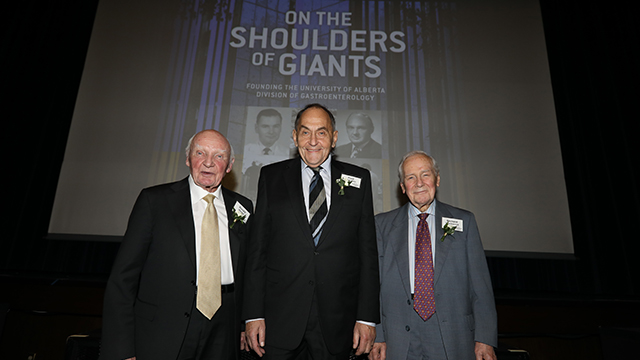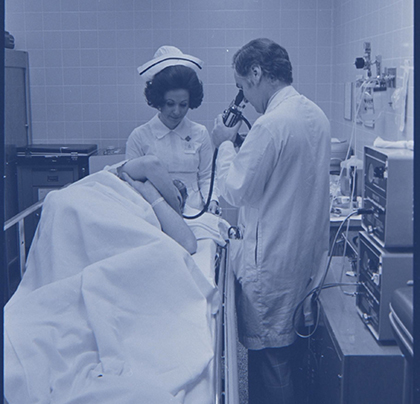
From left to right: Ronald Wensel, Wilfred Weinstein and Richard Sherbaniuk at the premiere of On the Shoulders of Giants. (Photo: Perry Mah)
Three medical pioneers-Richard Sherbaniuk, Ronald Wensel and Wilfred Weinstein-are now featured in the spotlight of a film documentary. The film, called On the Shoulders of Giants, is a true Alberta story about how these three hard-working doctors from the prairies went on to build the U of A's now world-renowned Division of Gastroenterology.
Gastroenterology is the branch of medicine focused on the digestive system and its disorders. Diseases affecting the gastrointestinal tract, which include organs from the mouth to the anus along the body's alimentary canal, are the focus of the specialty including the liver and the pancreas.
The documentary premiered to a crowd of more than 300 supporters from Alberta's medical community, during a special VIP screening on November 25 at the Royal Alberta Museum. The film details the early days of the division and how the trio of doctors worked to change the face of patient care and medical education in Alberta. Among their accomplishments, the doctors made it possible for physicians to qualify for specialty training without having to travel abroad.

Richard Sherbaniuk scoping a patient during the early days of gastroenterology in Alberta.
Prior to the 1960s, the Royal College of Physicians and Surgeons of Canada offered only two specialty qualifications for doctors in Canada: a Fellowship in General Medicine or a Fellowship in General Surgery.
"Alberta doctors often left the country for training in England or the United States but returned to develop their sub-specialties and improve the structure of health care in their home province. It was with this in mind that Dr. Richard Sherbaniuk and Dr. Ronald Wensel founded the Division of Gastroenterology at the University of Alberta Hospital," explained Jenna Bailey, an oral historian and Senior Research Fellow at the Centre for Oral History and Tradition at the University of Lethbridge.
Bailey and her film production company Bailey and Soda Films were commissioned by Richard Fedorak, gastroenterologist and dean of the U of A's Faculty of Medicine & Dentistry, to bring to life these important moments in Canadian medical history for generations to come.
Sherbaniuk and Wensel were the first gastroenterologists to practice the speciality in Alberta. Both had grown up in the Edmonton area with aspirations to improve the quality of health care in Alberta. After graduating from the U of A Medical School, they both pursued further training in the United States and returned to Edmonton in the 1960s.
Meet the Giants of UAlberta's Division of Gastroenterology:
Richard Sherbaniuk, born in Vegreville in 1927, received his MD and his MSc from the University of Alberta in 1952 and 1956, respectively. In 1956, he moved to Detroit to do a residency in internal medicine at the Henry Ford Hospital. Sherbaniuk returned to Edmonton in 1960 to be the first and only gastroenterologist at the University of Alberta Hospital and in the province.
Sherbaniuk was the Director of the Division of Gastroenterology from 1967-1969 and again from 1980-1986. He retired from practicing medicine in 2012 and is a Professor Emeritus at the University of Alberta.
Ronald Wensel, born in Edmonton in 1932, graduated from the University of Alberta medical school in 1956. He completed residencies in Toronto and Seattle before returning to Edmonton in 1963.
Wensel was Director of the Division of Gastroenterology from 1969-1980. In 1990, Wensel retired from his clinical practice and became Vice President (Medical) of Research for the University Hospital for five years. He officially retired in 1997 and is a Professor Emeritus at the University of Alberta.
Wilfred Weinstein, born in Melville, Saskatchewan in 1940, graduated from Queen's University medical school in 1964. He completed his residency in Montreal and his fellowship in Seattle before being hired by the University of Alberta in 1970.
Weinstein was one of the first gastroenterologists in Canada who combined clinical practice and clinical research. His research contributed significantly to the field of gastroenterology. He was a professor of medicine and associate clinical professor of pathology at the University of Alberta, and left in 1979 to move to Los Angeles to work for the Center for Ulcer Research and Education (CURE), where he worked as a professor of medicine until he retired in 2013.
Through the pair's efforts, the Division of Gastroenterology was formally established in 1967. Three years later they recruited Weinstein to be the first full-time academic gastroenterologist at the U of A. Together, the trio grew the program and created a gastroenterology fellowship training program, the first of its kind in Western Canada.
The fellowship program was groundbreaking. Rather than a program that just involved the doctors training informally, which was the standard of the time, Weinstein established a formal program that involved rotations in other disciplines such as pathology and radiology. The program provided the fellows with structured training from experts in the distinctive fields. It has since gone on to attract more than 80 doctors from around the world.
Jenna Bailey's father, Robert J. Bailey, was the first GI Fellow in the Fellowship Training Program. He says Wensel and Sherbaniuk were so committed to ensuring that the Division and the fellowship program become a success that they invested their personal funds in the training of the fellows and supporting research. He describes the division's founders as leading teachers and exceptional physicians.
"Every gastroenterologist that graduated from our program will credit Dr. Sherbaniuk and Dr. Wensel with teaching the art of being 'a real doctor,' talking to patients, examining them, establishing an investigation plan and treating them with the best therapy of the day," said Bailey. "Now that Dick has retired, I frequently see patients who have graduated from his care. Be certain that they miss him and always inquire as to how he is doing. When we fellows from the early days of the program reflect on our training we recognize that we often have Ron to thank for the extra encouragement and, at times, direct involvement in advancing our education and careers. It reminds me of how high these two have set the bar for the rest of us. Fred Weinstein was the ideal partner to join these two clinicians."
The three doctors established a solid foundation for the Division of Gastroenterology to ensure continued success. The division that began with only two faculty members now has more than 60 working at eight regional hospitals and health centres.